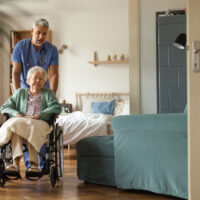What are the Most Common Types of Nursing Home Abuse?

When a family decides to place a loved one in a nursing facility, it is assumed they will be safe and well taken care of. But as the expression goes – never assume.
While a nursing home is charged with providing compassionate, responsive care for this vulnerable population, some individuals, especially those suffering from mental decline, can become the perfect victim for abuse in nursing homes, largely because they cannot express what is happening to them.
Whether it is the infliction of pain, neglect, sexual, financial, or even mental abuse, it is the height of cruelty to abuse and neglect individuals who have given their whole life to others and now are in a vulnerable position and need care.
In Alabama, there are 231 nursing homes, with 27,397 beds, according to the Alabama Nursing Home Association. More than 85% of residents say they would recommend their nursing home to others. That is the good news. Then there are the other facilities.
When shopping for a long-term facility, a key consideration may be its ownership. In 2010, the General Accounting Office reported that the poorest performing facilities were more likely to be part of chain or for-profit entity. When less money is spent on registered nurses, staff and the facility, profits are higher for shareholders, but outcomes may be worse for residents.
Let’s look at the ways a nursing home may fail in its duty to care for our elders.
Common types of Nursing Home Abuse
- Bruises, bedsores – Also known as pressure sores or pressure ulcers, these occur when someone is not moved often enough in their bed, wheelchair, or chair and indicates neglect. If there is a loss of bowel or bladder, it can further irritate the condition. A pressure sore can advance into gangrene where the tissue dies, allowing bacterial infection. Also look for cuts or rashes that may indicate inadequate care and attention.
- Anxiety and fear – This can result from any kind of abuse such as yelling, kicking slapping, threats, and humiliation. Also, any sexual abuse will likely result in fear that it could happen again. Check for STDs and genital infections.
- Weight loss and/or Dehydration – Is the elderly resident eating? Are they getting enough water? Some elders may lose their appetite but it’s important they eat on a regular basis and may need encouragement to do so. A careful facility will keep an eye on food and water consumption.
- Disorientation – An individual who cannot express themselves in the face of stress may appear to be disoriented and not themselves. Check their care as well as medications which can also mimic what many assume is disorientation and part of aging. It is also possible that the patient may be overmedicated.
- Verbal Abuse – As difficult as it is to believe, some caregivers may yell at, chastise, or tease a resident who cannot help some of their actions. This is inexcusable behavior, but it happens.
- Resident on resident abuse – When a facility does not have enough eyes to watch what is going on, incidents of acting out on one another can occur.
- Large financial transactions – A patient who is unable to conduct his own financial affairs, yet has money in the bank, is a prime target for any financial abuse such as cash transactions or transfers. Check your loved one’s bank records often.
- Poor Hygiene – Something for any caregiver to watch is how often their loved one is bathing, having their hair washed, and clothes and sheets cleaned. A clean facility should smell clean and not like urine or feces.
If you want to research further before choosing any particular home, you might check the Medicare.gov Nursing Home comparison tool. It compiles statistics on Alabama nursing home violations and fines.
Nursing Home Injury Attorney
If you suspect nursing home injury, it is important to document what you can including photos, medical records, and other documents. Make sure you note the names of witnesses and get their story. Nursing home abuse should be reported to the various offices that oversee elder care in Alabama. They include the Office on Aging, Adult Protective Services, Alabama Advocates from Quality Care, and the Department of Senior Services, among others.
The Alabama Attorney General will be interested in any reports of Medicaid Fraud as well.
It is best to involve a personal injury attorney to make sure your evidence is collected, and the proper authorities are notified. Attorney J. Allen Brown understands the groundwork that needs to be established to prove liability in these complex cases. Contact his Mobile office at 251-473-6691 as soon as you can so we can begin the process of helping your loved one without any further delay.
Sources:
Alabama Nursing Home Abuse Assistance
http://www.nursinghomepatientrights.com/Alabama_Nursing_Home_Abuse_Assistance.htm
Medicare
https://www.medicare.gov/nursinghomecompare/search.html




